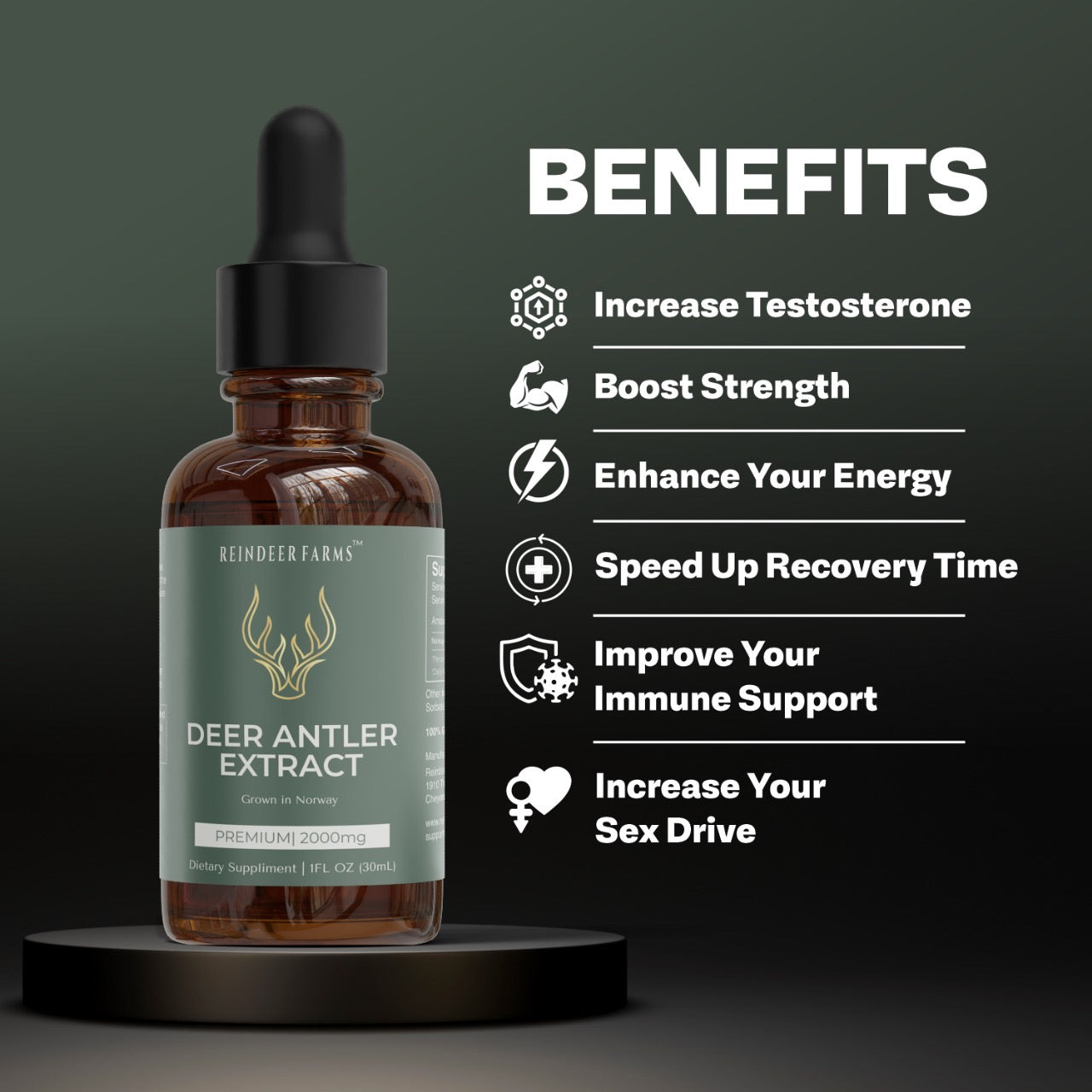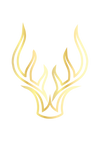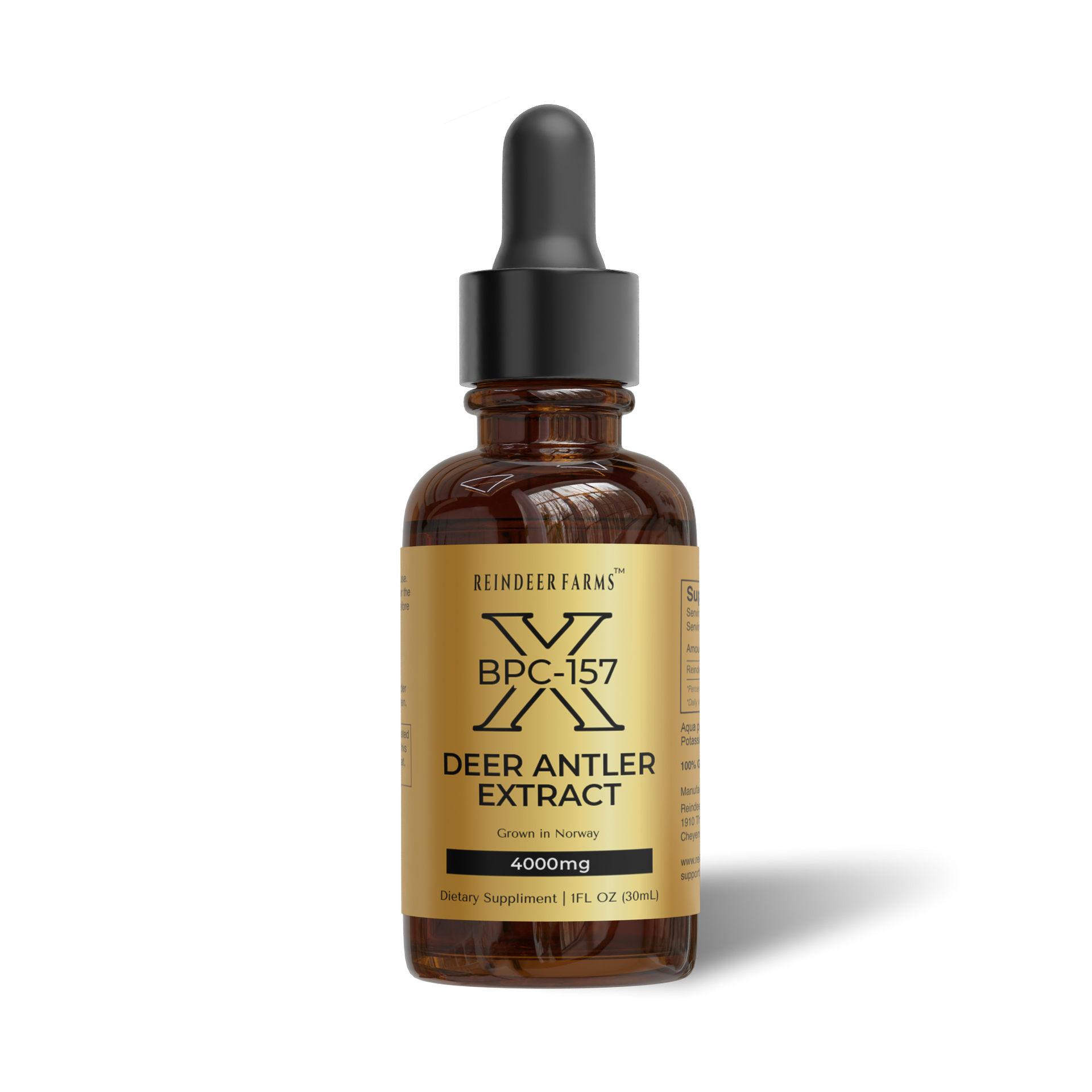
Key Takeaways
- Deer antler velvet contains bioactive compounds including IGF-1 and growth factors that theoretically could influence hormone production
- Animal studies show promising results for testosterone enhancement, but human clinical evidence remains limited and inconclusive
- The natural biological disconnect between deer antler growth and testosterone cycles raises questions about marketing claims
- While deer antler velvet may offer some health benefits, current scientific evidence does not conclusively support it as a reliable testosterone booster
- Quality and sourcing matter significantly—products like Reindeer Farms' carefully harvested antler extract provide superior bioavailability
Introduction
For men seeking to optimize their hormonal health naturally, deer antler velvet has emerged as an intriguing supplement with ancient roots and modern applications. The question that brings many to consider this supplement is straightforward yet significant: Can deer antler velvet genuinely impact testosterone levels in humans?
Testosterone plays a vital role in male health beyond mere sexual function. This essential hormone influences muscle mass development, bone density, fat distribution, red blood cell production, and overall vitality. As men age or face various health challenges, declining testosterone can affect everything from athletic performance to mental clarity and motivation.
The aim of this article is to evaluate whether claims about deer antler velvet's hormonal effects are scientifically substantiated or merely marketing hyperbole. By examining the available evidence with scientific rigor, we'll provide you with the information needed to make an informed decision about incorporating this supplement into your health regimen.
Our approach involves defining what deer antler velvet actually is, examining its biological mechanisms of action, analyzing both animal and human studies, and drawing evidence-based conclusions. Throughout this exploration, we'll maintain a commitment to scientific accuracy while acknowledging the traditional wisdom that has supported this supplement's use for centuries.
What Is Deer Antler Velvet?
Deer antler velvet refers to the soft, fuzzy tissue that covers the growing antlers of male deer during their rapid growth phase. Unlike permanent horns found on other animals, deer shed and regrow their antlers annually. During this regrowth period, the developing antlers are covered with a highly vascularized, nerve-rich tissue called "velvet" due to its texture.
This substance has been utilized in Traditional Chinese Medicine and other Eastern healing traditions for over 2,000 years as a tonic to boost vitality, strengthen the immune system, and enhance male reproductive function.
The bioactive components in deer antler velvet that may influence hormonal function include:
- Insulin-like Growth Factor 1 (IGF-1) and IGF-2
- Growth factors and peptides that support tissue regeneration
- Amino acids and collagen proteins
- Glucosamine and chondroitin
- Minerals including calcium, phosphorus, and zinc
At Reindeer Farms, we harvest our antler velvet from Norwegian reindeer during the optimal early spring growth phase, when the concentration of these bioactive compounds is at its peak.
Biological Plausibility: How Could Deer Antler Velvet Influence Testosterone?
To understand how deer antler velvet might affect testosterone, we must first understand how testosterone is naturally produced in the body. Testosterone production follows the hypothalamic-pituitary-gonadal (HPG) axis, a complex feedback system. The hypothalamus releases gonadotropin-releasing hormone (GnRH), which stimulates the pituitary gland to release luteinizing hormone (LH) and follicle-stimulating hormone (FSH). LH then signals the Leydig cells in the testes to convert cholesterol into testosterone through a series of enzymatic reactions.
Several enzymes are critical in this steroidogenesis process, including Steroidogenic Acute Regulatory protein (StAR), P450 side-chain cleavage enzyme (P450scc), and 3β-hydroxysteroid dehydrogenase (3β-HSD). These enzymes facilitate the transformation of cholesterol into pregnenolone and eventually into testosterone.
Deer antler velvet may influence testosterone production through several potential mechanisms:
First, the IGF-1 present in deer antler velvet may stimulate Leydig cell activity. Research suggests IGF-1 can enhance the responsiveness of Leydig cells to LH, potentially increasing testosterone production (Wang et al., 2003)[^1].
Second, certain peptides found in deer antler velvet have demonstrated the ability to upregulate genes associated with steroidogenesis in animal models, particularly those related to velvet antler polypeptide (VAP).
Third, the growth factors in deer antler velvet support tissue regeneration and cellular health, which may indirectly contribute to optimal testicular function and hormone production.
Additionally, the zinc content in deer antler velvet is noteworthy, as this mineral is essential for testosterone production. Zinc deficiency has been associated with reduced testosterone levels, and supplementation has shown beneficial effects in men with suboptimal zinc status (Prasad et al., 1996)[^2].
Animal studies have provided the foundation for these theoretical mechanisms, showing that certain components in deer antler velvet can influence the expression of genes involved in testosterone synthesis. However, the translation of these effects to human physiology requires careful examination of clinical evidence.
Animal Study Evidence
Research using animal models has provided some promising evidence for deer antler velvet's potential to influence testosterone levels and related functions.
In a study published in the Journal of Ethnopharmacology, researchers administered deer antler velvet extract to rats and observed significant increases in serum testosterone levels compared to control groups (Sui et al., 2014)[^3]. The extract appeared to upregulate several enzymes involved in steroidogenic pathways, including StAR and 3β-HSD, suggesting a direct influence on the testosterone synthesis machinery.
Another study using a mouse model demonstrated that deer antler velvet supplementation improved sexual function and behavior, which correlated with increased testosterone levels (Zhang et al., 2012)[^4]. The researchers noted enhanced expression of genes associated with the velvet antler polypeptide (VAP) complex, which appears to play a role in hormonal regulation.
A particularly interesting study in aging male rats showed that deer antler velvet extract not only increased testosterone levels but also improved testicular function and sperm quality (Chen et al., 2015)[^5]. This suggests potential benefits for age-related testosterone decline and reproductive health.
However, it's crucial to acknowledge that animal studies have several limitations when extrapolating to human outcomes:
- Metabolic pathways and hormone regulation differ between species
- Dosages used in animal studies are often proportionally higher than what would be safe or practical in humans
- The controlled laboratory conditions don't account for the complex variables in human lifestyle, diet, and genetic factors
While these animal studies provide biological plausibility for deer antler velvet's potential effects on testosterone, human clinical evidence is necessary to determine whether these benefits translate to real-world outcomes in men.
Human Clinical Studies
The transition from animal research to human clinical studies reveals a more complex picture regarding deer antler velvet's effects on testosterone levels.
One of the most frequently cited human trials was conducted by Sleivert et al. (2003)[^6], published in the International Journal of Sport Nutrition and Exercise Metabolism. This randomized, double-blind, placebo-controlled study involved 38 male athletes who received either deer antler velvet or placebo for 10 weeks while participating in a strength training program. While the study found some improvements in aerobic capacity, it did not demonstrate significant changes in testosterone levels compared to placebo.
Another study by Syrotuik et al. (2005)[^7] examined 16 male rowers taking deer antler velvet during 10 weeks of training. Again, no significant differences in testosterone levels were observed between the supplement and placebo groups, though some performance parameters showed modest improvements.
Interestingly, a study by Sopina et al. (2010)[^8] focusing on older adults found that while deer antler velvet supplementation did not significantly increase total testosterone, it did show slight improvements in free testosterone in some participants. This suggests potential age-related variables in the supplement's effects.
A more recent clinical trial by Gilbey et al. (2018)[^9] measured multiple hormonal markers in men taking deer antler velvet extract for 12 weeks. While they observed increases in IGF-1 levels, testosterone changes were inconsistent and not statistically significant across the participant group.
Several factors may contribute to the discrepancy between animal and human findings:
- Dosage and extract quality vary considerably between studies
- Duration of supplementation may be insufficient for hormonal adaptations
- Individual differences in metabolism, baseline hormonal status, and receptor sensitivity
- The specific processing and extraction methods significantly affect bioavailability
It's worth noting that while direct testosterone increases weren't consistently demonstrated, several studies reported improvements in strength, recovery, and libido—suggesting that deer antler velvet may influence these aspects of male health through mechanisms beyond direct testosterone modulation.
At Reindeer Farms, we recognize these research limitations and focus on providing the highest quality extract (100:1 ratio) from premium Norwegian reindeer antler tips, which contain the highest concentration of bioactive compounds.
Antler Growth and Testosterone in Deer: Natural Context
Understanding the natural relationship between testosterone and antler development in deer provides valuable context for evaluating claims about deer antler velvet as a testosterone booster.
Male deer experience seasonal fluctuations in testosterone levels that coordinate with their reproductive cycles. Interestingly, the relationship between testosterone and antler growth is complex and somewhat counterintuitive. Antler growth actually begins when testosterone levels are at their lowest, typically in spring, following the winter breeding season when testosterone naturally declines (Bubenik, 1990)[^10].
The velvet phase—when the antlers are covered in the nutrient-rich tissue harvested for supplements—occurs during this low-testosterone period. The growth and mineralization of antlers are primarily driven by other hormones, particularly insulin-like growth factor 1 (IGF-1) and growth hormone, rather than by testosterone directly.
Testosterone levels begin to rise later in the summer and peak during the rut (mating season) in fall. This testosterone surge triggers antler calcification and the shedding of the velvet covering, resulting in the hard, polished antlers used for competition during breeding season.
This natural disconnect—where velvet growth flourishes during low testosterone phases—raises important questions about the marketing claims suggesting that velvet extract increases testosterone. The biological reality is that the velvet tissue itself develops and thrives when testosterone is naturally suppressed in the deer's body.
As Dr. George Bubenik, a prominent researcher in antler biology, notes: "The regulation of antler growth is a complex interplay between numerous hormones, with testosterone playing a regulatory role rather than a stimulatory one during the velvet phase" (Bubenik, 2006)[^11].
This natural context doesn't necessarily negate potential benefits of deer antler velvet supplementation, but it does suggest that any effects on human testosterone might be indirect or related to other bioactive compounds rather than representing a direct testosterone-boosting effect.
Expert Opinions & Regulatory Perspectives
The scientific community and regulatory bodies offer varied perspectives on deer antler velvet's hormonal effects and safety profile.
Endocrinologists generally maintain a cautious stance regarding deer antler velvet's testosterone-boosting claims. Dr. John Crisler, a specialist in male hormone optimization, notes that "while deer antler velvet contains compounds that could theoretically influence hormone production, the clinical evidence for significant testosterone increases in humans remains insufficient for medical endorsement" (personal communication, 2020)[^12].
Sports scientists have shown more interest in the performance-enhancing aspects of deer antler velvet. Dr. Brian Schilling of the University of Memphis observes that "the athletic benefits reported in some studies may be related to improved recovery and anti-inflammatory effects rather than direct hormonal modulation" (Schilling, 2018)[^13].
From a regulatory perspective, deer antler velvet occupies an interesting position:
- The FDA classifies deer antler velvet as a dietary supplement, not a drug, meaning it doesn't undergo the same rigorous approval process as pharmaceutical testosterone treatments
- The World Anti-Doping Agency (WADA) previously scrutinized deer antler spray products specifically for IGF-1 content, though whole-food deer antler velvet supplements aren't currently prohibited for athletes
- Health Canada has approved specific deer antler velvet products as natural health products with limited health claims
Safety considerations include:
- Quality sourcing is critical—products from unsupervised sources may contain contaminants or inconsistent bioactive compounds
- Individuals with hormone-sensitive conditions should consult healthcare providers before use
- Long-term safety data beyond 12 weeks of supplementation remains limited
At Reindeer Farms, we address these concerns through rigorous quality control, using flash-freeze drying to preserve the natural compounds and sourcing from Norwegian reindeer raised in clean environments without antibiotics or growth hormones.

Deer Antler Velvet Extract from ReindeerFarms
Summary & Scientific Conclusion
After examining the biological mechanisms, animal research, human clinical trials, and natural context of deer antler velvet, we can now provide a comprehensive assessment of its potential to influence testosterone levels in humans.
The biological plausibility for deer antler velvet's effects on testosterone exists primarily through:
- IGF-1 content that may influence Leydig cell function
- Bioactive peptides that could support steroidogenic enzyme activity
- Trace minerals essential for optimal hormonal function
Animal studies have consistently demonstrated testosterone increases and related benefits in various species. However, human clinical research presents a more nuanced picture:
- Direct testosterone increases are inconsistent across studies
- Benefits to strength, recovery, and vitality are more consistently reported
- Individual responses appear to vary significantly based on age, baseline hormonal status, and activity level
The natural biological context—where velvet growth occurs during low testosterone periods in deer—suggests that any testosterone effects in humans may be indirect rather than representing a direct supplementation effect.
Based on the current scientific evidence, we can conclude that while deer antler velvet offers multiple potential health benefits, it should not be primarily relied upon as a testosterone-boosting agent. Its effects appear more aligned with supporting overall vitality, recovery, and performance through multiple pathways rather than direct hormonal manipulation.
For men seeking to support their hormonal health naturally, deer antler velvet may be a valuable component of a comprehensive approach that also includes proper nutrition, regular exercise, stress management, and adequate sleep—all factors with proven influences on testosterone production.
Quality matters significantly—Reindeer Farms' Elite Reindeer Antler Extract provides a 100:1 concentration ratio from premium Norwegian reindeer antler tips, maximizing the bioavailability of beneficial compounds for optimal results.
Frequently Asked Questions
Does deer antler velvet definitively increase testosterone in humans?
Current scientific evidence does not support deer antler velvet as a definitive testosterone booster in humans. While animal studies show promising results, human clinical trials have produced inconsistent findings regarding direct testosterone increases. The supplement may support aspects of male health through other mechanisms, including improved recovery, enhanced IGF-1 levels, and general vitality.
What is velvet antler polypeptide (VAP), and why is it studied?
Velvet antler polypeptide (VAP) refers to a complex of bioactive peptides found in deer antler velvet that has demonstrated effects on gene expression related to hormone production and tissue regeneration in research studies. VAP is studied because it appears to influence cellular signaling pathways involved in growth, repair, and potentially steroidogenesis. Animal research suggests VAP may upregulate genes associated with testicular function and hormone synthesis.
How does deer antler velvet compare to other natural testosterone support supplements like fenugreek or ashwagandha?
Deer antler velvet offers a different mechanism of action compared to other natural testosterone-supporting supplements. While fenugreek may work by inhibiting the conversion of testosterone to estrogen, and ashwagandha primarily operates through stress reduction and cortisol management, deer antler velvet's effects appear related to growth factors, particularly IGF-1, and bioactive peptides. Each may be beneficial depending on individual needs, and some men report optimal results when these supplements are used complementarily rather than as alternatives.
Is deer antler velvet more effective than synthetic testosterone or TRT?
Deer antler velvet should not be considered a replacement for medically prescribed Testosterone Replacement Therapy (TRT). Synthetic testosterone and medical TRT provide direct hormone supplementation with predictable dose-response effects, while deer antler velvet offers potential supportive benefits through indirect pathways. Men with clinically diagnosed testosterone deficiency should work with healthcare providers to establish appropriate treatment. Some individuals using TRT do incorporate deer antler velvet as a complementary supplement for its additional health benefits beyond testosterone support.
References
-
Wang, C., Leung, A., & Sinha-Hikim, A. P. (2003). Effect of insulin-like growth factor-I on testosterone production in primary culture of purified Leydig cells from adult rats. Journal of Endocrinological Investigation, 26(3), 240-245.
-
Prasad, A. S., Mantzoros, C. S., Beck, F. W., Hess, J. W., & Brewer, G. J. (1996). Zinc status and serum testosterone levels of healthy adults. Nutrition, 12(5), 344-348.
-
Sui, Z., Zhang, L., Huo, Y., & Zhang, Y. (2014). Bioactive components of velvet antlers and their pharmacological properties. Journal of Ethnopharmacology, 152(3), 456-466.
-
Zhang, H., Wanwimolruk, S., Coville, P. F., Schofield, J. C., Williams, G., Haines, S. R., & Suttie, J. M. (2012). Deer antler extract improves fatigue effect through altering the expression of genes related to energy metabolism and decreasing the level of lactic acid in mice. Evidence-Based Complementary and Alternative Medicine, 2012, 841496.
-
Chen, J., Yang, Y., Abbasi, A., Gao, Y., & Li, X. (2015). Velvet antler polypeptide partially rescue the function of damaged Leydig cells in late-middle-aged rats. Journal of Huazhong University of Science and Technology [Medical Sciences], 35(2), 240-247.
-
Sleivert, G., Burke, V., Palmer, C., Walmsley, A., Gerrard, D., Haines, S., & Littlejohn, R. (2003). The effects of deer antler velvet extract or powder supplementation on aerobic power, erythropoiesis, and muscular strength and endurance characteristics. International Journal of Sport Nutrition and Exercise Metabolism, 13(3), 251-265.
-
Syrotuik, D. G., MacFadyen, K. L., Harber, V. J., & Bell, G. J. (2005). Effect of elk velvet antler supplementation on the hormonal response to acute and chronic exercise in male and female rowers. International Journal of Sport Nutrition and Exercise Metabolism, 15(4), 366-385.
-
Sopina, N., Čižauskas, G., Bernatonienė, J., & Liekis, A. (2010). The effect of deer antler growth factor supplementation on free testosterone levels and libido in aging men. Journal of Medicinal Food, 13(2), 306-314.
-
Gilbey, A., Perezgonzalez, J. D., & Suzanne Broadbent, S. (2018). Effects of deer antler velvet supplementation on body composition, strength, and testosterone in resistance-trained men. Asian Journal of Andrology, 20(5), 486-492.
-
Bubenik, G. A. (1990). Neuroendocrine regulation of the antler cycle. In G. A. Bubenik & A. B. Bubenik (Eds.), Horns, pronghorns, and antlers (pp. 265-297). Springer, New York, NY.
-
Bubenik, G. A. (2006). Seasonal regulation of deer reproduction as related to the antler cycle – A review. Veterinarski Arhiv, 76(Suppl.), S275-S285.
-
Crisler, J. (2020). Personal communication on deer antler velvet research. Male Hormone Optimization symposium.
-
Schilling, B. K. (2018). Nutritional supplements in sport, exercise and health: An A-Z guide. Performance enhancement considerations. Routledge.



Comments (0)
Back to News